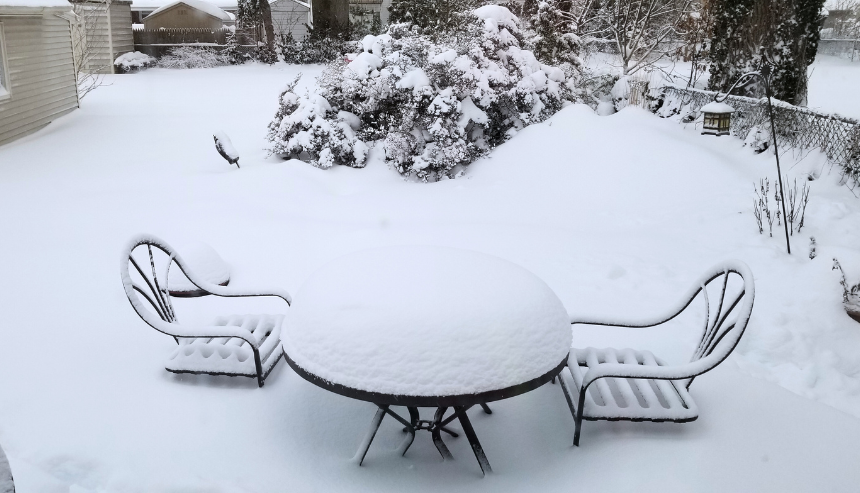Leaving your house vacant this winter? Worried about freezing pipes, pesky pests, or your heating system breaking down? Don’t fret! Learning how to winterize your vacant house can help you avoid these headaches.
Don’t skip important tasks! Create a winterizing checklist. (See our Snowbird Checklist below).
If you’re a homeowner in Matawan, NJ, or nearby Monmouth and Middlesex counties, this guide is for you. We’ll walk you through simple steps to protect your property during the entire winter. Let’s make sure you return to a cozy, problem-free home!
Key Takeaways
- Actively winterize your vacant home to prevent damage from frozen pipes, structural strain, pests, and theft and keep it safe and secure throughout the winter months.
- Homes in Matawan, NJ, and Monmouth County need particular attention due to the heightened risk of severe weather conditions such as freezing temperatures, wind damage, and tree damage.
- Engage in regular maintenance and set up remote monitoring to effectively manage and protect your vacant property while away.
Winterization for Snowbirds in Matawan, NJ, and Monmouth and Middlesex Counties
Snowbirds leaving their homes in Matawan, NJ, and nearby counties for the season face unique challenges. Winterization protects from harsh winter conditions, like snowfall, storms, downed trees and power outages. This task is influenced by geography, climate, and infrastructure, making it essential for homeowners to be mindful of weather risks.
Types of Damage That Can Happen While You Are Away
Winter can bring many problems. Pipes might freeze and burst, snow can pile up and damage your roof, and pests can find their way inside looking for warmth – not to mention risks like fire or theft.
Flooding – One of the primary concerns is the proximity to the Raritan Bay coastline, which exposes properties to severe coastal weather. Areas like South Amboy and Sandy Hook are especially prone to flooding and extreme weather, making winterization challenging. Also, parts of Matawan and other low-lying regions in Middlesex County are susceptible to flooding during heavy rain or snowmelt.
Use measures such as installing flood barriers and sump pumps in flood-prone areas. Flood barriers, like sandbags or flood gates, can be placed around exterior doors and low windows to keep water out during heavy rains or storm surges.
Add a sump pump in the basement or lowest level of your structure to help remove accumulated water, reducing the risk of flood damage. It’s important to check the functionality of a sump pump regularly. It should be in good working order and have a battery backup in case of power outages.
Snowfall – Monmouth County, including Matawan, experiences moderate snowfall. It typically ranges from 20 to 30 inches per season. However, New Jersey snowfall can vary significantly from year to year, sometimes bringing heavy snowstorms. Even moderate accumulation can cause structural damage. In particular, an ice dam can form on the roof, leading to water damage. Following the winterization tips below can help stave off many issues.
Pro Tip: The number one tip for preventing snow damage to a vacant home is to ensure proper roof maintenance and snow removal.
Accumulated snow can cause significant stress on the roof, leading to structural damage, leaks, and even roof collapse. Installing snow and ice breakers prevents ice from falling off the roof and damaging cars, pets or people.
Snow melting systems help prevent ice buildup in gutters and downspouts, which helps prevent ice dams and keeps water from getting inside your home. Enlist a neighbor or property manager to keep an eye on the roof snow and have a professional snow removal company clear the roof as needed.
Winter Storms – Winters in Monmouth and Middlesex Counties can bring strong winds and coastal storms, which pose extra challenges for homeowners. Coastal homes need additional measures to guard against saltwater corrosion and wind damage.
To shield a vacant property from windstorm damage, fasten or store all outdoor items to prevent them from becoming projectiles. Anchor any outdoor structures like sheds or gazebos to the ground. Additionally, trim trees and shrubs around the property to minimize the risk of damage from broken branches.
Homeowners can prepare by understanding regional hazards and taking appropriate measures. This understanding helps confirm their properties are well-prepared and can lessen the impact of seasonal threats.
Snowbird Checklist for Leaving Home
Before you head south for the winter, here are a few things to check off your list.
Secure Your Plumbing Against Cold Weather
As cold weather hits, your home’s plumbing system (including toilet bowls, toilet tanks, and pipes next to the house’s exterior) is at risk. If pipes aren’t safeguarded, they can freeze and burst, causing water damage.
Prevent Frozen Pipes in Freezing Temperatures
With the onset of a freeze, your plumbing is at risk, but proactive measures can safeguard it and prevent expensive fixes.
- Using pipe sleeves or heat tape offers effective insulation to prevent frozen pipes. Insulation is especially important in areas like crawl spaces and unfinished basements that don’t get much heat.
- Open kitchen and bathroom cabinet doors along exterior walls. Open doors raise the temperature inside the cabinets, helping to prevent pipes from freezing during cold weather. This simple action can mitigate the risk of water in homes.
- Draining Water Systems Thoroughly. If your home will be empty in the winter, shut off the water and drain all residual water from the plumbing system, including your hot water heater. This safeguards your home’s plumbing and wards off water damage. When draining the water heater, follow the manufacturer’s guidelines to prevent burning out the heating element.
Pro Tip: Water is usually left in the p-trap after draining the water system. Pour a small amount of antifreeze into your sinks and toilets as an extra precaution.
- Read more about preventing water damage.
Preparing Your Heating System for Winter Hiatus
Focus on your home’s heating system. It is one of your home’s defenses against the cold. Make sure it’s ready to do its job all season long.
- Service the Heating System. Regular maintenance is vital to keeping your heating system and water heater running smoothly. If you have a forced hot air system, change the furnace filter regularly to keep everything working efficiently.
- Set Thermostats Appropriately. When you won’t be home, set your thermostat to at least 58 degrees Fahrenheit. A warm house helps prevent your pipes from freezing and ensures your fridge and freezer keep running correctly.
- Opening doors throughout your house helps evenly spread heat. Even heat mitigates the chances of pipes freezing in cooler rooms and helps maintain a warm house.
Read more about how to prevent frozen pipes and how to defrost them.
Fortify the Exterior
The outer parts of your home serve as the initial barrier from a winter storm. Make sure your exterior is fortified to handle whatever the weather throws at it.
- Secure Doors and Windows. Your windows and doors are portals to the outside. In winter, they can let cold drafts and moisture seep in. Adding storm windows offers an additional layer of defense against wintery gusts.
- Caulking and weather-striping your doors and windows also help to reduce heat escape and lessen the threat of water getting inside.
- Clear Gutters and Roofs. Snowfall may look pretty, but it can cause a lot of damage to your home if you don’t take care of it properly. After a heavy snowfall, clear the roof to stave off any structural harm or leaks. While away, enlist a neighbor or snow removal company for this task.
- Keep your gutters and downspouts clear. Clear gutters allow adequate water flow and reduce the risk of flooding around your home.
Deter Unwanted Guests
No one likes uninvited guests, but a vacant house can attract unwanted visitors. These can range from critters searching for a warm place to nest to burglars looking for easy targets.
- Pest Control Measures. Preventive pest control measures are crucial, especially when your place is unoccupied. Seal openings around doors and windows to reduce the chance of an infestation. Regular pest control can also help keep out those unwanted guests.
- Use Motion-Sensitive Exterior Lights. Vacant properties may not only become a haven for pests but also lure intruders. Motion-sensitive exterior lights, which turn on when they detect movement, are an efficient strategy for warding them off.
- Safety and Security Enhancements. Reinforce the safety and protection of your home when it will be empty for a long time. You can do this in various ways, such as setting up alarms, arranging lights on timers, and using intelligent gadgets that enable remote surveillance.
Pro Tip: Use a smart home monitoring system to keep an eye on your property while you’re away. These systems are typically user-friendly and easy to set up.
- Install an Alarm System. Installing an alarm system is an effective method to boost the security of your home. Be sure to conduct regular inspections of the security alarm system, especially before you expect to be gone for a long time. An alarm system helps keep your property safe and is a strong deterrent to would-be burglars.
- Use Timed Interior Lights. Using programmable timers to control interior lights is an easy way to make your house look occupied. Set the timers to turn lights on and off in different rooms, especially those with windows facing the street. This creates the impression that someone is home, keeping burglars at bay.
Safeguard Valuables and Personal Items
- Secure Valuables. Secure your valuables and personal belongings before leaving your home empty. Store your valuables in a safe or safety deposit box. Additionally, hold your mail to prevent it from piling up, which can signal that no one is home.
- Manage Utilities and Services. Managing your utilities and services when you’re away is important for avoiding problems and saving money. Turn off unnecessary appliances, adjust your thermostat, and make sure all lights are off or on timers. Also, suspend non-essential services and let your utility providers know you are gone.
Engage Local Support
- Ask a reliable neighbor, friend, or professional property manager to check on your house while you’re away. This will ensure that someone can notice and address potential problems early, giving you peace of mind.
Review Insurance Coverage
- Review your insurance coverage before leaving your house empty. Typical insurance policies may not provide adequate protection for vacant homes. Consult with your insurance provider to guarantee that your property has complete coverage.
Final Preparations Before Departure
Right before locking your door and leaving:
- Shut the fireplace flue
- Move vehicles into the garage.
- Check that all windows and doors are locked, and
- Set your alarm system.
- Make sure to empty the trash to avoid unpleasant odors.
Emergency Preparedness
- While we hope you’ll never have to use it, create an emergency plan to deal with unforeseen events. Having a plan and knowing who to contact during a crisis can offer comfort and guarantee rapid action when necessary.
Contact Numbers
- Have all vital contact information with you while you are away. Include phone numbers for your local keyholder, insurance agent, security company, local fire department, and emergency property damage service. Having these contacts at your fingertips is preferable to being in a situation where you need them but don’t have them.
Dealing with Property Issues from Afar
If your property is damaged while you are gone, knowing how to manage this situation is key. A nearby keyholder equipped to evaluate the circumstances and execute needed measures can prove indispensable.
As winter approaches, properly preparing your vacant home is vital to prevent damage and guard your investment. From securing the plumbing system to protecting your home from snow and wind damage, taking these proactive steps can save you from expensive repairs and stress.
- Keep PuroClean of Matawan on your list of important numbers. This can be invaluable in a property emergency while you are away for the winter. We provide 24/7 property damage remediation and water damage services in Monmouth and Middlesex Counties. Our number is (732) 351-2442.




 PuroClean of Matawan
PuroClean of Matawan